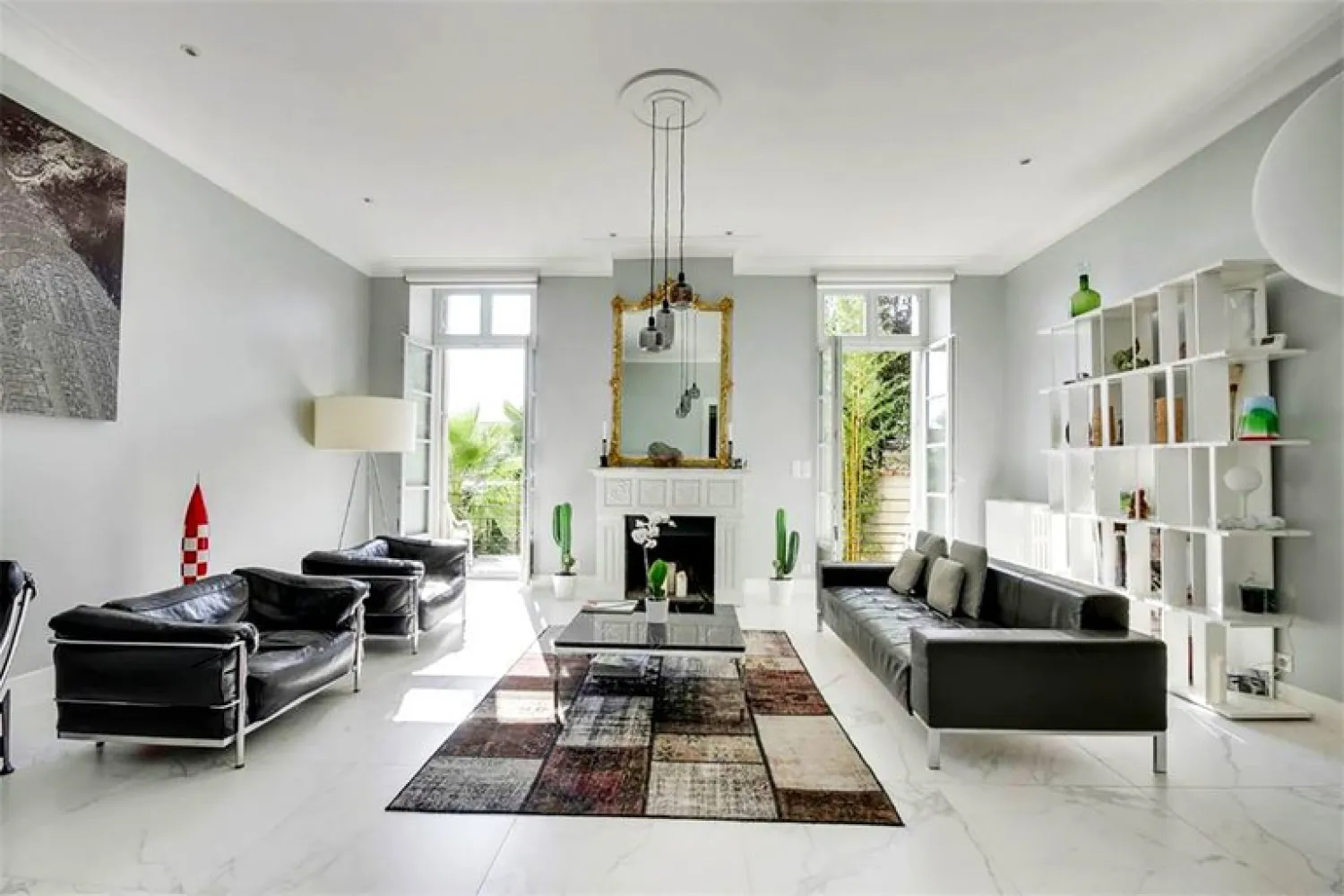This six-bedroom, late 19th-century house, just west of the center of Bordeaux, was renovated by its current owner, preserving original elements like the marble staircase, fireplaces and hardwood floors.
Past the front door, glass-and-wood double doors open to an entrance hall with a half-bath, a translucent glass ceiling and stairs leading down to the garden level and up to the main floor. The garden level has a large bedroom with a shower, a laundry room, storage and a half-bath. The main floor has an open kitchen-and-dining area and a living room with dove-gray walls, a fireplace and French doors to a terrace and the garden below.
The second-floor landing serves as an office; a half-bath is adjacent. (The landing’s glass floor is the entrance hall’s ceiling.) The second floor has three bedrooms, including the master suite, and the third floor has two more bedrooms, both air-conditioned. In all, there are four half-baths, one on each floor; five bedrooms have en-suite showers, and the master suite has a bathtub and shower.
The 3,500-square-foot house sits on an approximately 7,000-square-foot lot. The owner, Jérôme Nivaux, said he saved as much of the original detail as possible during the renovation, although the layout was reconfigured and the paint, plumbing, electricity and double-paned windows are all new.
The house is a few steps from a boulangerie, cheesemonger and market; tram stops and a supermarket are about 400 yards away. A new high-speed train makes the trip to Paris in two hours from the Bordeaux-Saint-Jean station about three miles from the house. Bordeaux’s international airport is a 20-minute drive.
MARKET OVERVIEW
Bordeaux, which has a population of about 250,000, has “exploded with optimism and enthusiasm” in the last five years, said Michael Baynes, an executive partner of Maxwell-Baynes, the affiliate of Christie’s International Real Estate in southwestern France. He credited Bordeaux’s restaurants and its proximity to the beach and wine country, as well as the high-speed train.
Thanks to limited supply and increased demand, especially from French buyers outside Bordeaux, properties tend to sell quickly and prices have been rising, agents said. Parisians, in particular, have been moving to Bordeaux and working remotely, said Aymeric Sabatié-Garat, associate director of the Bordeaux branch of Barnes, a luxury real estate agency.
This year, there are about half as many luxury properties — homes priced at 1 million euros or more — on the market as there were in 2015, Mr. Sabatié-Garat said. And since 2014, luxury prices have gone up between 50 and 60 percent, he estimated, while in the general market, where there is more supply, prices increased by only about 20 percent during the same period.
Etienne Delpech, a broker with Bordeaux Sotheby’s International Realty, which has the listing for this house, said the first half of 2017 was busy for his agency, with homes selling quickly and usually at asking price. Since the end of the summer, though, some properties have been discounted during negotiations or lingered on the market, he said, many of them in the city center, where prices have increased the most.
Desirable areas include Le Triangle d’Or, the blocks around the Public Garden and the fashionable Chartrons neighborhood, agents said. In the most coveted places, prices of luxury properties start at 7,000 euros a square meter (or about $770 a square foot), Mr. Delpech and Mr. Sabatié-Garat said. Luxury prices throughout the city center average about 3,500 to 4,500 euros a square meter (or $380 to $490 a square foot), Mr. Baynes said.
Chateau vineyards constitute a separate market in the Bordeaux region. A small winery can be bought for 500,000 euros (or about $590,000), Mr. Baynes said, but the “vast majority” sell for between 3 million and 5 million euros (about $3.5 million to $5.9 million), while some 20 percent fetch upward of 5 million euros.
WHO BUYS IN BORDEAUX
Most home buyers in Bordeaux are French; those who buy vineyards are more likely to be foreign.
Mr. Delpech said that fewer than 10 percent of his buyers this year were from foreign countries, including Germany, Belgium, Switzerland, the United States, China and Lebanon. About half of his French buyers were local, he said, and the other half were mostly from Paris.
Mr. Baynes said that only 10 percent of his vineyard buyers were from France; 40 percent were from the United States, with the rest from other parts of Europe and Asia.
BUYING BASICS
Real estate transactions in France require a notary, and sometimes a lawyer as well — when a transaction is particularly complex, for example, or for tax optimization, or when a sale involves a residence and a business, as in the case of a working vineyard, said Vianney Rivière, managing partner of Rivière Avocats Associés, a Bordeaux firm that specializes in real estate and tax law.
For a home valued around 2 million euros, like this one, closing costs paid by the buyer — including the notary’s fees, a value-added tax on that service, stamp duty and a mortgage registration fee, if applicable — would total around 7 to 8 percent of the purchase price, Mr. Rivière said.
LANGUAGES AND CURRENCY
French; euro (1 euro = $1.18)
TAXES AND FEES
The annual property taxes on this house are 1,850 euros (about $2,200), Mr. Nivaux said.
The New York Times









